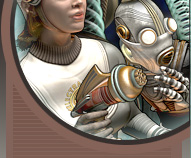The Ray-O-Zap Model Three hovercar has several important safety features. In the event of a catastrophic failure - like, for example, a sudden loss of lift and power - its safety reserves expend themselves in a final burst of activity.
Before it strikes the ground the Model Three reverses its field and ejects the pilot. Reversing the field stabilizes the surface: this prevents collateral damage to, say, a rooftop, so that the hovercar doesn't break through. The hovercar, as a result, holds the impact area in place until a repair crew can arrive. Ejecting the pilot ensures that the pilot will fall clear of the wreck. A nasty bump at the end, the engineers concluded, will just serve as a reminder not to be so stupid next time.
The system has worked flawlessly in every case because the odds of the hovercar's pilot landing on anything dangerous, like, for example, a skylight, are so astronomically small.
A week after Bonnie's crash these engineers decided to make some minor adjustments to the system. It had turned out that astronomically small odds did, from time to time, place skylights where they weren't expected to be. Who kne




